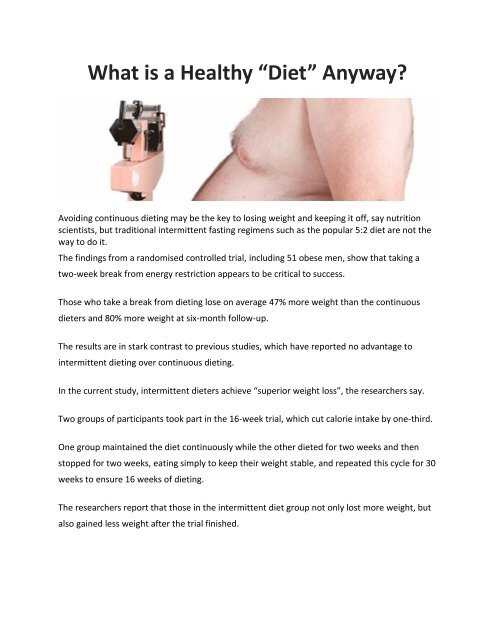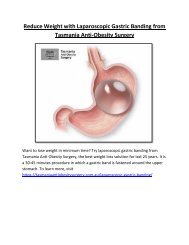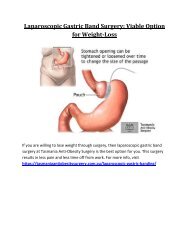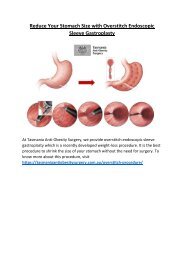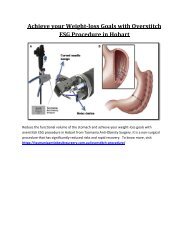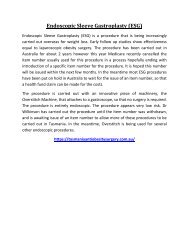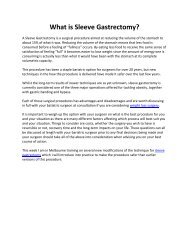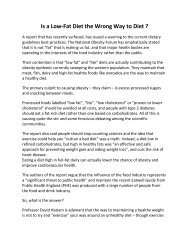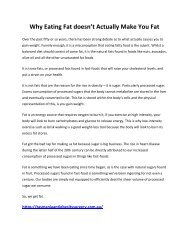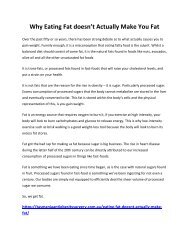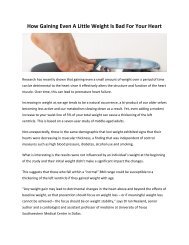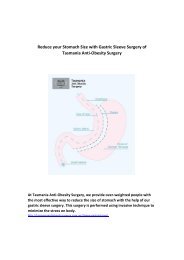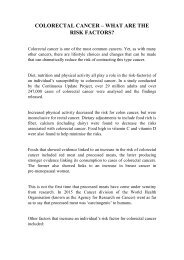What is a Healthy “Diet” Anyway
Healthy diet leads to healthy life. Consuming good nutrition is an important part of leading a healthy lifestyle. We all think that diet taken by us is healthy, but if we see according to nutritionists it is actually not a healthy diet. To know what a healthy diet is, read the attachment is provided.
Healthy diet leads to healthy life. Consuming good nutrition is an important part of leading a healthy lifestyle. We all think that diet taken by us is healthy, but if we see according to nutritionists it is actually not a healthy diet. To know what a healthy diet is, read the attachment is provided.
Create successful ePaper yourself
Turn your PDF publications into a flip-book with our unique Google optimized e-Paper software.
<strong>What</strong> <strong>is</strong> a <strong>Healthy</strong> <strong>“Diet”</strong> <strong>Anyway</strong>?<br />
Avoiding continuous dieting may be the key to losing weight and keeping it off, say nutrition<br />
scient<strong>is</strong>ts, but traditional intermittent fasting regimens such as the popular 5:2 diet are not the<br />
way to do it.<br />
The findings from a random<strong>is</strong>ed controlled trial, including 51 obese men, show that taking a<br />
two-week break from energy restriction appears to be critical to success.<br />
Those who take a break from dieting lose on average 47% more weight than the continuous<br />
dieters and 80% more weight at six-month follow-up.<br />
The results are in stark contrast to previous studies, which have reported no advantage to<br />
intermittent dieting over continuous dieting.<br />
In the current study, intermittent dieters achieve “superior weight loss”, the researchers say.<br />
Two groups of participants took part in the 16-week trial, which cut calorie intake by one-third.<br />
One group maintained the diet continuously while the other dieted for two weeks and then<br />
stopped for two weeks, eating simply to keep their weight stable, and repeated th<strong>is</strong> cycle for 30<br />
weeks to ensure 16 weeks of dieting.<br />
The researchers report that those in the intermittent diet group not only lost more weight, but<br />
also gained less weight after the trial fin<strong>is</strong>hed.
“Although both groups regained weight post-intervention, weight loss (reduction from<br />
baseline) was on average 8.1kg greater in the intermittent group than the continuous group at<br />
six-month follow-up,” they write in International Journal of Obesity.<br />
Th<strong>is</strong> suggests that interrupting dieting with energy balance ‘rest periods’ may reduce<br />
compensatory metabolic responses and, in turn, improve weight loss efficiency, says lead<br />
author Professor Nuala Byrne, head of the University of Tasmania’s School of Health Sciences.<br />
“It seems that the ‘breaks’ from dieting we have used in th<strong>is</strong> study may be critical to the success<br />
of th<strong>is</strong> approach,” she says, adding that these findings suggest the intermittent model <strong>is</strong> a<br />
“superior alternative” to continuous energy restriction.<br />
http://tasmaniaantiobesitysurgery.com.au/


